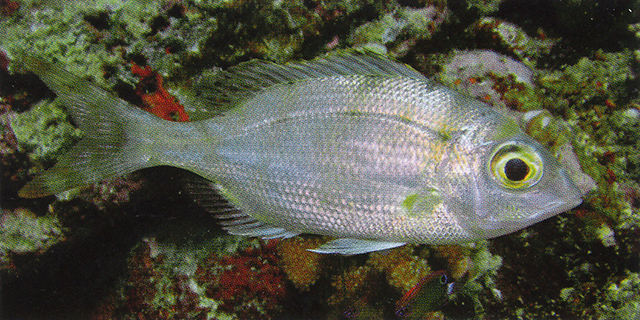| Lethrinidae (Emperors or scavengers), subfamily: Monotaxinae |
| 35 cm TL (male/unsexed) |
|
demersal; depth range 50 - 100 m, non-migratory |
| Indo-West Pacific: east Africa and Seychelles to the Solomon Islands, north to southern Japan, south to northern Australia. |
|
Dorsal spines (total): 10-10; Dorsal soft rays (total): 10-10; Anal spines: 3-3; Anal soft rays: 10-10. Description: Lower edge of eye is intersected by line from snout tip to the middle of the caudal fin fork. Eye diameter usually about equal to the length of the snout. The interorbital space is convex and about equal to eye diameter. The inner surface of the pectoral fin axil is scaleless. Overall color is silver, sometimes slightly brown dorsally, with about eight transverse brown bars on the sides, the first crossing through the eye, the remainder below the dorsal fin and across the caudal peduncle. Scattered blotches and speckling is sometimes evident on sides. Fins are clear to yellow-orange with caudal margins and tips often deep red (Ref. 2295). Body depth 2.2-2.4 in SL (Ref. 90102). |
| Inhabits sandy or low-relief rocky bottoms (Ref. 11228). Feeds on bottom-living invertebrates. Marketed fresh (Ref. 9775). May be solitary or in small groups, on flat offshore trawling grounds, occasionally near shallow coral reefs (Ref. 90102). |
|
Not Evaluated
(Ref. 96402)
|
| harmless |
|
Source and more info: www.fishbase.org. For personal, classroom, and other internal use only. Not for publication.
Page created by Jen, 05.08.02,
php script by kbanasihan 06/09/2010 ,
last modified by
dsantos, 20/08/10

